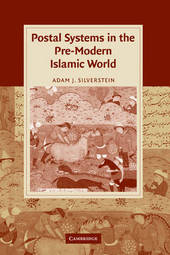
|
Postal Systems in the Pre-Modern Islamic World
Hardback
Main Details
Description
Adam Silverstein's book offers a fascinating account of the official methods of communication employed in the Near East from pre-Islamic times through the Mamluk period. Postal systems were set up by rulers in order to maintain control over vast tracts of land. These systems, invented centuries before steam-engines or cars, enabled the swift circulation of different commodities - from letters, people and horses to exotic fruits and ice. As the correspondence transported often included confidential reports from a ruler's provinces, such postal systems doubled as espionage-networks through which news reached the central authorities quickly enough to allow a timely reaction to events. The book sheds light not only on the role of communications technology in Islamic history, but also on how nomadic culture contributed to empire-building in the Near East. This is a long-awaited contribution to the history of pre-modern communications systems in the Near Eastern world.
Author Biography
Adam Silverstein is Lecturer in Islamic History at the Oriental Institute, University of Oxford.
Reviews"Adam Silverstein's work on postal systems (i.e., the barid) and communications in the medieval Islamic world goes a long way toward correcting one of the deficiencies in the field.... Silverstein is to be commended for this ambitious project; it is a welcome and much needed addition to the field. Students and scholars of the political, economic, and administrative history of medieval Islam will benefit greatly from the foundation he has provided." - International Journal of Middle East Studies "The greatest value of this work to scholars and students interested in the premodern Islamic world is that Silverstein places this detailed description of postal systems into the broader picture of the political traditions of particular dynasties and rulers, notably the pre-Umayyads, Umayyads, Abbasids, Samanids, Chaznavids, Fatimids, Seljuks, Il-Khanids, and Malmuks." - The Historian
|